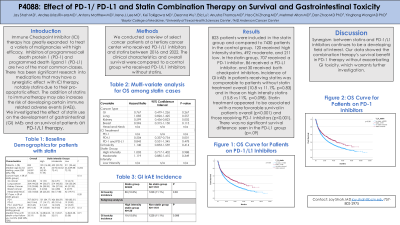Tuesday Poster Session
Category: Practice Management
P4088 - Effect of PD-1/ PD-L1 and Statin Combination Therapy on Gastrointestinal Toxicity Related to Immune Checkpoint Inhibitors and on Survival
Tuesday, October 24, 2023
10:30 AM - 4:00 PM PT
Location: Exhibit Hall

Has Audio
- JS
Jay S. Shah, MD
Baylor College of Medicine
Houston, TX
Presenting Author(s)
Jay S. Shah, MD1, Andres Urias Rivera, MD2, Antony Mathew, MD3, Anusha Thomas, MD4, Hao Chi Zhang, MD4, Mehmet Altan, MD5, Dan Zhao, MD, PhD5, Yinghong Wang, MD4
1Baylor College of Medicine, Houston, TX; 2BCM Medical School, Houston, TX; 3UT Houston, Houston, TX; 4University of Texas MD Anderson Cancer Center, Houston, TX; 5MD Anderson Cancer Center, Houston, TX
Introduction: Immune Checkpoint Inhibitor (ICI) therapy has greatly expanded its approval to treat a variety of malignancies with high efficacy. Inhibitors of programmed cell death protein 1 (PD-1) and programmed death ligand 1 (PD-L1) are two of the most common classes of ICI therapy. There has been significant research into medications that may have a synergistic effect with ICI therapy, notably statins due to their pro-apoptotic effect. The addition of statins to immunotherapy may also increase the risk of developing certain immune related adverse events (irAEs). We sought to investigate the effect of statin use on the development of gastrointestinal (GI) irAEs and on survival of patients on PD-1/L1 therapy.
Methods: We conducted a review of select cancer patients at a tertiary cancer center who received PD-1/L1 inhibitors and statins between 2016 and 2022. The clinical characteristics and overall survival were compared to a control group who received PD-1/L1 inhibitors without statins.
Results: A total of 823 patients were included in the statin group and compared to 11101 patients in the control group. In the statin group 707 received a PD-1 inhibitor, 86 received a PD-L1 inhibitor, and 30 received both checkpoint inhibitors. The included cancer types were lung cancer (44%), kidney cancer (26%), head/neck cancer (19%), and GI cancer (7.0%). The overall incidence of GI irAEs in patients receiving statins was 10.8%, which was comparable to patients without statin treatment (11.1%, p=0.83). In addition, statin treatment appeared to be associated with a more favorable survival in patients overall (p= 0.004) and also those with GI irAEs (p=0.047).
Discussion: Synergism between statins and PD-1/L1 inhibitors continues to be a developing field of interest. Our data showed the combination therapy’s survival benefit without exacerbating GI toxicity, which warrants further investigation of this treatment strategy.
Disclosures:
Jay S. Shah, MD1, Andres Urias Rivera, MD2, Antony Mathew, MD3, Anusha Thomas, MD4, Hao Chi Zhang, MD4, Mehmet Altan, MD5, Dan Zhao, MD, PhD5, Yinghong Wang, MD4. P4088 - Effect of PD-1/ PD-L1 and Statin Combination Therapy on Gastrointestinal Toxicity Related to Immune Checkpoint Inhibitors and on Survival, ACG 2023 Annual Scientific Meeting Abstracts. Vancouver, BC, Canada: American College of Gastroenterology.
1Baylor College of Medicine, Houston, TX; 2BCM Medical School, Houston, TX; 3UT Houston, Houston, TX; 4University of Texas MD Anderson Cancer Center, Houston, TX; 5MD Anderson Cancer Center, Houston, TX
Introduction: Immune Checkpoint Inhibitor (ICI) therapy has greatly expanded its approval to treat a variety of malignancies with high efficacy. Inhibitors of programmed cell death protein 1 (PD-1) and programmed death ligand 1 (PD-L1) are two of the most common classes of ICI therapy. There has been significant research into medications that may have a synergistic effect with ICI therapy, notably statins due to their pro-apoptotic effect. The addition of statins to immunotherapy may also increase the risk of developing certain immune related adverse events (irAEs). We sought to investigate the effect of statin use on the development of gastrointestinal (GI) irAEs and on survival of patients on PD-1/L1 therapy.
Methods: We conducted a review of select cancer patients at a tertiary cancer center who received PD-1/L1 inhibitors and statins between 2016 and 2022. The clinical characteristics and overall survival were compared to a control group who received PD-1/L1 inhibitors without statins.
Results: A total of 823 patients were included in the statin group and compared to 11101 patients in the control group. In the statin group 707 received a PD-1 inhibitor, 86 received a PD-L1 inhibitor, and 30 received both checkpoint inhibitors. The included cancer types were lung cancer (44%), kidney cancer (26%), head/neck cancer (19%), and GI cancer (7.0%). The overall incidence of GI irAEs in patients receiving statins was 10.8%, which was comparable to patients without statin treatment (11.1%, p=0.83). In addition, statin treatment appeared to be associated with a more favorable survival in patients overall (p= 0.004) and also those with GI irAEs (p=0.047).
Discussion: Synergism between statins and PD-1/L1 inhibitors continues to be a developing field of interest. Our data showed the combination therapy’s survival benefit without exacerbating GI toxicity, which warrants further investigation of this treatment strategy.
Disclosures:
Jay Shah indicated no relevant financial relationships.
Andres Urias Rivera indicated no relevant financial relationships.
Antony Mathew indicated no relevant financial relationships.
Anusha Thomas indicated no relevant financial relationships.
Hao Chi Zhang indicated no relevant financial relationships.
Mehmet Altan: Astra Zeneca – Advisory Committee/Board Member. BMS – Advisory Committee/Board Member. GSK – Advisory Committee/Board Member, Grant/Research Support. Nektar therapeutics – Advisor or Review Panel Member, Grant/Research Support.
Dan Zhao indicated no relevant financial relationships.
Yinghong Wang: ilyapharma – Consultant. IOTA – Consultant. Janssen – Consultant. MabQuest – Advisory Committee/Board Member. Sorriso – Consultant. Tillotts – Consultant.
Jay S. Shah, MD1, Andres Urias Rivera, MD2, Antony Mathew, MD3, Anusha Thomas, MD4, Hao Chi Zhang, MD4, Mehmet Altan, MD5, Dan Zhao, MD, PhD5, Yinghong Wang, MD4. P4088 - Effect of PD-1/ PD-L1 and Statin Combination Therapy on Gastrointestinal Toxicity Related to Immune Checkpoint Inhibitors and on Survival, ACG 2023 Annual Scientific Meeting Abstracts. Vancouver, BC, Canada: American College of Gastroenterology.
